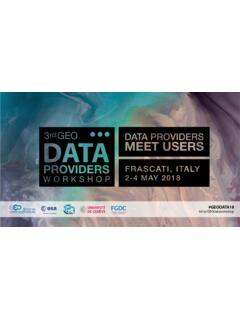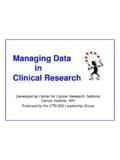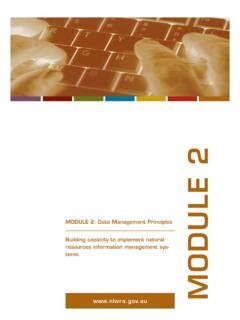Transcription of Principles of Good Data Management - The University of ...
1 Intra-governmental Groupon Geographic InformationThe Principles of Good data ManagementIntra-governmental Group on Geographic InformationThe Principles of Good data ManagementThis guide, version , September 2000 was prepared by the IGGI working group on Principles and Practice of GI data Management . Thanks to Margaret Wagget (ONS) and herteam, Stefan Carlyle (EA), James Denman (ONS), Jerry Giles (BGS), and Alan Oliver (DETR)for their considerable efforts in putting this guide copies of this report are available from:Department of the Environment, Transport and the RegionsIGGI Secretariat3/H9 Eland HouseBressenden PlaceLondon SW1E 5 DUTelephone 020 7944 5517 Fax: 020 7944 5519e-mail.
2 Service Crown Copyright 2000 Copyright in the typographical arrangement and design vests in the of this publication may be made for non-commercial in-house use, subject to thesource being for reproduction should be made in writing to The Copyright Unit, HerMajesty s Stationery Office, St Clements House, 1-16 Colegate, Norwich NR3 by the Department of the Environment, Transport and the in the UK, September 2000 on paper comprising 75% post-consumer wasteand 25% ECF code By Alan Oliver, IGGI ChairmanOne of the cornerstones of the Modernising Government agenda is betteruse of Information and Communications Technology for electronic deliveryof services and information, for the benefit of business, the citizen andgovernment is investing substantial resources in the development of ICTsystems and networks.
3 At the same time government policies are openingup government data for wider use. The technical barriers to electronicexchange of data have largely been overcome. However, the physicalnetworks are only a means to an end, and the benefits of the newtechnology will only be realised if the information they carry is whatusers need. Geographic Information (GI) provides a good example. Governmentdepartments and agencies hold huge amounts of geographic information,much of which has been collected for specific policy or operationalpurposes. Much of the value of GI lies in the ability to bring different datasets together for joint analysis.
4 For this to be effective the data have toconform to recognised standards and delivery formats that the user canhandle, and need to be accompanied by good documentation. All of this adds up to a need for good data of IGGI, whose aim is to improve the effective use of governmentGeographic Information, decided to pool their experiences and produce aself-help guide to good practice in data Management . The result is thisdocument, which will be distributed widely among holders of governmentgeographic information. Since most of the Principles apply equally to othertypes of data , we hope the guide may also be of wider value.
5 The guide sets out general Principles but does not provide detaileddescriptions for specific data Management activities. Nor can it provide afull description of relevant government policies and initiatives. Datacustodians should refer to other guidance for such detail. The Web versionof this guide will be supported by references and links to other and suggestions for improvement will be welcome contactdetails are on the web would like to thank all those who contributed to the preparation of thisguide, and hope that it can play a part in raising standards of datamanagement in Purpose of this guide12.
6 What is data Management ? 13. Why do we need to manage our data ? 2 Key drivers for improved data Management2 Benefits of good data Management34. Principles of good data Management5 data policy5 data ownership5 data documentation and metadata compilation6 data quality, standardisation and harmonisation7 data lifecycle control8 data stewardship8 data access and dissemination9 data audit95. Establishing a data Policy10 data acquisition10 data care Stewardship10 data use and exchange 116. Implementing data Management key roles11 data Management Champion12 data Policy Manager12 data Stewards127.
7 Further guidance13 Annex 1. Glossary of Terms141. Purpose of this guide Government departments and agencies collect, generate, store and use largeamounts of data which have been obtained at considerable cost. Many ofthese data are geographical in that they are referenced to geographicallocations, such as points, lines or areas. The booklet, entitled Geographic Information: A Charter Standard Statement published by the Intra-governmental Group on Geographic Information(IGGI) in September 2000, sets out the standards of good practice oninformation handling that users can expect. Many individual departmentsand agencies have used this broad framework as the basis for their owngeographic information policy statement.
8 This guide provides the next step in advising officials responsible forinformation handling, by providing general guidance on managing data as avalued resource. The guide had been produced for those responsible forGeographic Information, although the Management Principles are equallyrelevant to other types of government data . 2. What is data Management ? data Management embraces the whole range of activities involved in thehandling of data . These activities, include: data Policy; data Ownershipand responsibilities for ensuring Legislative Compliance; DataDocumentation and Metadata Compilation; data Quality, Standardisationand Harmonisation; data Lifecycle Control; data Stewardship; data Accessand Dissemination; and data Audit.
9 This guide covers only the key aspects of data Management . Other moredetailed guidance can be found on the IGGI Web site ( ). 13. Why do we need to manage our data ?Government owns huge amounts of irreplaceable Geographic Informationpotentially usable by a wide range of users and there are increasing pressureson departments/agencies to manage these data properly. Examples of thesepressures are identified drivers for improved data Management The strong direction from the Modernising Government programme ofwork, and particularly the strategy for Information Age Government, toimprove services and make more effective use of Governmentinformation resources.
10 Increasing recognition that Government data , collected at publicexpense, must be properly managed in order to realise their full potentialand justify their considerable production and maintenance costs. Increasing pressure from customers for easier and quicker access to theright information at little or no charge. Stronger emphasis within Government on the need to rationalise andcombine data in order to improve efficiency and add value. More reluctance from suppliers to provide data at affordable control required by data Owners over the use of their data tosafeguard their Intellectual Property Rights (IPR) and the confidentialityof sensitive data .









